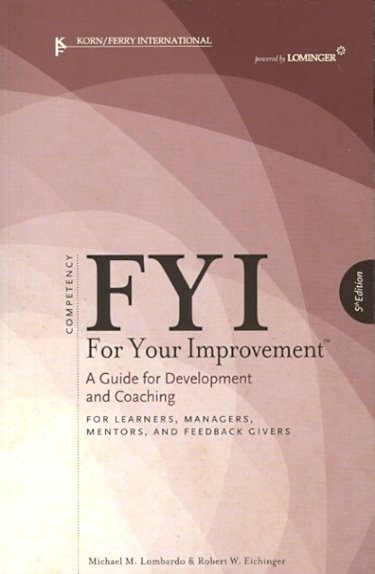Performance Feedback
Performance feedback, both giving AND receiving it, is critical to growth and development. With it, individuals can succeed. Without it, individuals will surely fail.
Since feedback is so critical to success, please read on for advice on how to do this well.

Performance Feedback
Unfortunately, some leaders are unskilled at giving and receiving feedback. This is due, in part, to poor role models and/or lack of coaching on how to give constructive feedback.
Now, it is expected that a leader should give performance feedback to their direct reports, but "best in class" organizations ensure feedback occurs:
- Peer to Peer
- Leader to Direct Report
- Direct Report to Leader
In essence, feedback is a response to a person's performance of a given task. It should be constructive, specific, timely, consistent and objective.
Constructive
Giving positive feedback tends to be pretty easy, but giving constructive feedback can be difficult.
Constructive feedback is designed to correct future behavior, not punish the person for past performance.
Some managers will readily tell employees what they did wrong, or could improve upon. But they neglect to tell their direct report what he/she did well. They are critical and their comments are too.
Feedback is constructive when it is used as a basis to improve the person's future performance.
Specific
When giving feedback, it is important to talk about the issue/situation. Be specific. Do not speak in general terms or make it personal by attacking the person's character.
I recall a situation (just recently) when a peer did not follow-up. Their lack of follow-up negatively affected my ability to meet a preset deadline. It was tempting to just "let it go" and not address the situation. But there was unresolved conflict, that could potentially impact future interactions.
Although I felt nervous about confronting the person, I was able to confront without being confrontational. I focused on their lack of follow-through and its impact on me and my work.
I felt positive about the outcome, and I think they did too.
Timely
In addition to being constructive and specific, feedback should be given in a timely manner.
Although formal performance discussions should occur at least quarterly, feedback should be given close to the time the performance is observed.
If the performance feedback is positive, I usually give it at the time I observe in. If it is constructive, I will select a time that works for both parties.
My husband was a Dale Carnegie instructor for several years. And according to him, this rule of management is one to live by, "Praise in public and reprimand in private."
Consistent
Some managers are consistently inconsistent. This behavior negatively affects their credibility.
It is very important to be consistent in offering and asking for feedback. Consistency instills confidence in the recipient, that whether good or bad, you can be counted on to give your feedback on their performance.
It is also important that you ask for feedback from your direct reports. If you do not get their feedback, how can you determine if you are an effective leader? In my estimation, it is the best way to identify steps you can take to become a leader who leads.
Objective
When giving feedback on a person's performance, it is important to be objective and keep your comments in perspective, especially if the person's performance did not meet expectations.
To keep it objective, use the person's job description as your basis for judging/evaluating their performance.
Keep your feedback in the context of their job description, what is expected of the person occupying the position and how well they performed what was expected.

Want To Know More?
Do you have difficulty giving and receiving feedback? If so, Hyler Bracey, in his book Building Trust: How To Get It! How To Keep It!, has outlined a very good process for giving and receiving feedback. I highly recommend it.
Improve Your Relationship with Your Boss
Are you looking to improve your relationship with your boss? If so, the Boss Relationship Worksheet will help you better understand and communicate more effectively with your immediate supervisor.
To download your copy, submit your information on the form below.
After completing the Boss Relationship Worksheet, you will find that the following will prove helpful in showing you how to cultivate a better working relationship with your boss:
 |
I published my first book and I am beyond excited.
Get your FREE copy of Called to Lead!
ORDER PRINT HERE

Leaders don't
create
followers.
Leaders
create
other
leaders.
- Tom Peters










